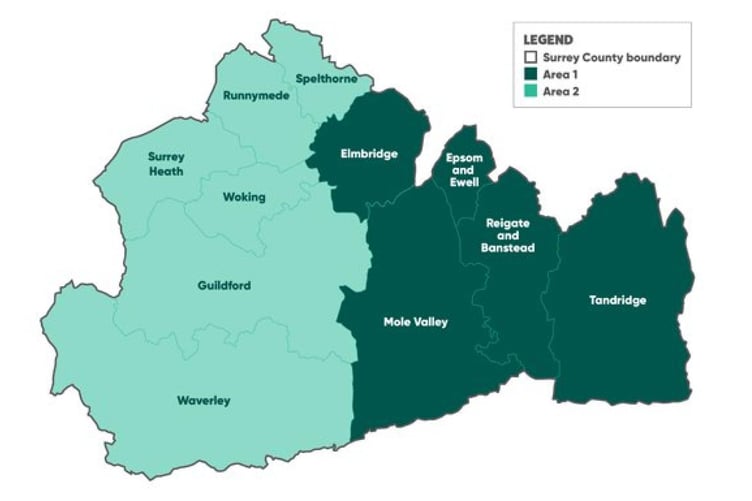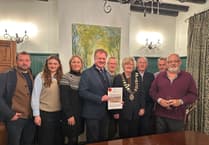Surrey’s rural south aligns better with Sussex
I have long felt that Chiddingfold and other rural parts of southwest Surrey would do well to be included with neighbouring parts of West Sussex and East Hampshire.
Geographically, environmentally and in terms of infrastructure needs, this part of Surrey has much more in common with its southern and western neighbours than with urbanised parts of the county on the fringes of London — particularly Spelthorne, which was oddly grafted on to Surrey in the 1960s.
Paddy Clark
Woodside Road
Chiddingfold
Let’s use facts to shape pond’s future
We were surprised to read Linda and Michael Smith’s reply (Herald and Post, July 17) to Cllr Don Hammond’s letter about the future of King’s Pond.
Their reading of Alton Town Council’s position on this matter - and that of Cllr Hammond in particular - does not accord with our experience. On the contrary, we are convinced the council maintains an open mind about the options and there is copious evidence of their encouraging people of all views to contribute to finding the right solution.
The topic of King’s Pond is highly emotive. We understand why people are worried about what happens. It is a place of great value to the people of Alton for all sorts of reasons, whether for recreation, enjoying the wildlife, or mental wellbeing, and there are understandable concerns about increased flooding risks if changes are made.
But there are also serious practical difficulties - including the costs now and in the future - arising from all the options under consideration, including keeping the pond as it is.
The council is therefore right to examine all those options rigorously. The full results of survey work and research they have commissioned are not yet known, so none of us currently has sufficient information on which to base a view about the best solution.
As the town's largest wildlife society and most active conservation group, we at Alton Natural History Society and Alton Local Action for Nation (AVLAN) believe we can help the council by providing as much data and objective evidence as possible about wildlife and habitats at the site.
We have also offered advice from a panel of our members who are professional ecologists and/or experts in their field and who are willing, at no cost, to use their expert judgment to comment on all the options under consideration.
There are understandable fears about damage that could be done to the pond’s wildlife and habitat if changes are made. But this is also a marvellous opportunity - whichever solution is chosen - to boost habitats at the site and increase the variety and abundance of wildlife.
Our expert members will be aiming not only to make sure any damage is kept to a minimum, but also to help come up with exciting ideas about improvements which would benefit both wildlife and people.
Cathy Wilson
Chair and Programme Secretary, Alton Natural History Society Alton
Jenny Griffiths
Trustee, Alton Climate Action Network (ACAN)
Blame IT for youth illiteracy
According to the latest news, it seems that UK has just produced a generation of illiterates. Eleven year olds with a reading ability of four-to-five year olds.
Unfortunately, the blame lies at the feet of irresponsible parents and the reckless use of mobile phones and social media.
Watching the Post Office developments, I would say the root cause is IT or those purporting to be IT technicians.
In my last job they were as efficient as chocolate fireguards. It seems that anybody who can spell ‘intelligence technology’ can qualify.
David Lloyd
Petersfield
Campaign ignores game shooting benefits
Animal Aid’s ‘Killing our Countryside’ campaign presents a bleak vision of the countryside that doesn’t resemble reality.
Their letter (Herald and Post, July 3) and the associated report it references, relies heavily on bias, anecdote, misrepresentation, and a highly selective use of evidence.
Let’s be clear – game bird shooting is a lawful, highly regulated activity governed by extensive legislation and environmental safeguards. Welfare of any birds being reared is subject to the same legislation as any other kept animals with standards set in Codes of Practice. Compliance is a legal requirement; not an optional extra.
Shooting contributes £3.3 billion to the UK economy and sustains rural jobs, while also supporting habitat restoration and the supply of healthy, sustainable game meat.
Shooting providers and volunteers deliver £500 million of conservation work annually, equivalent to 26,000 full-time jobs and 14 million workdays.
The truth is inconvenient for campaigners who would rather dismiss the contribution of those who actually manage the land. Sustainable shooting and conservation are closely intertwined.
As for wildlife crime, British Association for Shooting and Conservation (BASC) and the wider shooting sector have been unequivocal; any illegal activity is unacceptable, condemned outright, and should be prosecuted under the full weight of the law. A handful of offences by a tiny minority, do not make a sector criminal.
Conservation and game management go hand in hand. That truth may not suit Animal Aid’s narrative, but repeating a fallacy doesn’t make it a fact.
Glynn Evans
Head of Game and Wildlife Management
British Association for Shooting and Conservation
Generosity will help save lives
The Alton Royal National Lifeboat Institution (RNLI) Fundraising Branch would like to thank the wonderful people of Alton who gave so generously at our RNLI bucket collection on the High Street on June 28.
We raised a total of £421.58, which will go a long way to helping saves lives at sea and on our beaches around the UK.
Sheena Hancock
Secretary
Alton RNLI Fundraising Branch





Comments
This article has no comments yet. Be the first to leave a comment.